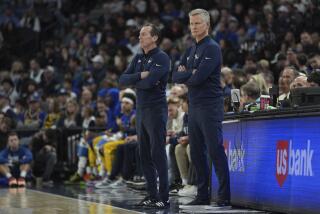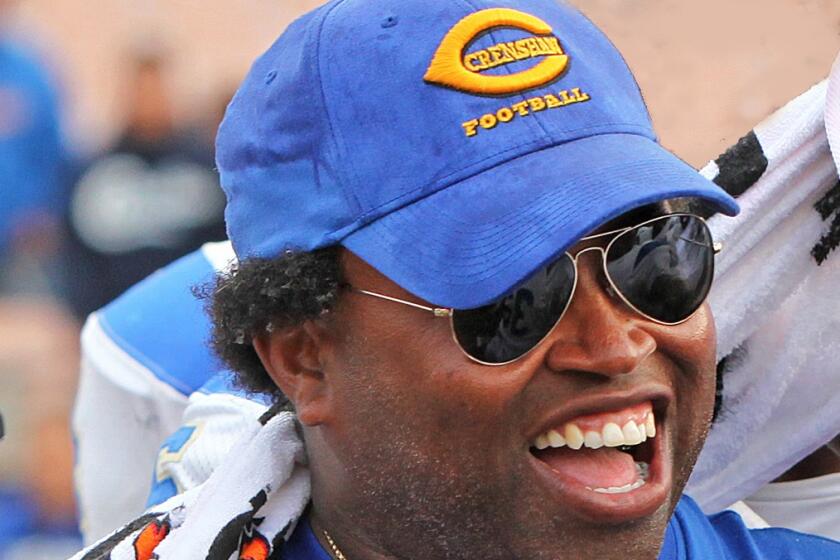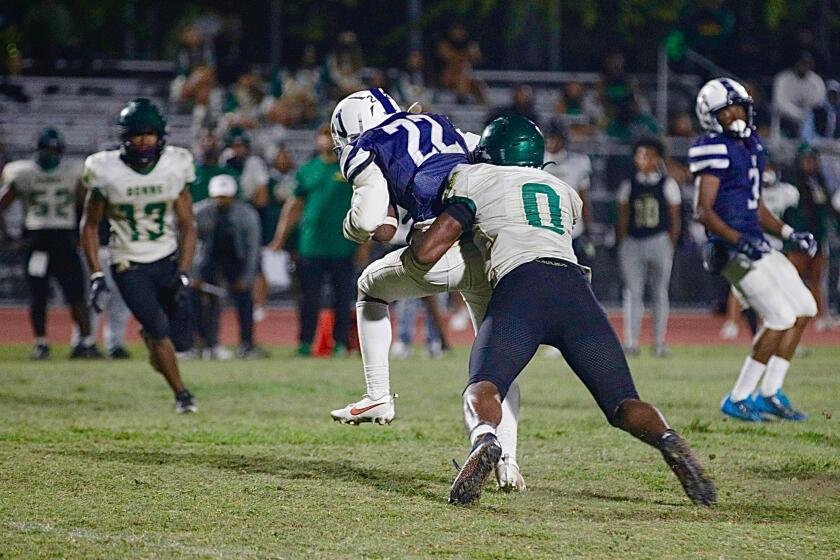He Gives His All, All the Time : Baseball: Former Golden West infielder Doug Mansolino, now coaching with White Sox, has made it through tough times by working hard.
ANAHEIM â There are no wasted motions in Doug Mansolinoâs life. Every step seems to have a purpose.
Case in point: Mansolino, a coach for the Chicago White Sox, was hitting ground ball after ground ball, pausing only to spit tobacco.
It was just batting practice. A time for infielders to loosen up. But Mansolino had seen enough.
He stopped, spit, and walked over to reserve shortstop Esteban Beltre. While line drives whizzed around them, Mansolino talked and motioned and demonstrated, then pointed to his head.
Beltre got the point. Mansolino went back and hit more ground balls to him.
âWhen they say theyâre dead tired, I say, âLetâs do five more,â â Mansolino said. âI push a little more to see a player put out more.â
Mansolino has been pushing and prodding--himself and others--most of his life.
That work ethic carried him through tough times, such as after the deaths of his mother and grandfather, which left him alone and on his own.
The shoulder-to-the-wheel, nose-to-the-grindstone approach also made him one of those players coaches rave about. He went through Golden West College, then Oral Roberts University, leaving glowing recommendations in his wake.
Now Mansolino has reached the major leagues. As a coach, not a player, but a workaholic nonetheless.
âIs there any other way to do it?â Mansolino said.
Not for him.
At 35, Mansolino is one of the youngest coaches in the major leagues. Heck, heâs nine years younger than White Sox catcher Carlton Fisk.
As young as he is, Mansolino already has put in four years with the White Sox, all on the minor league level as an instructor, not to mention the three years he spent working in the San Francisco Giantsâ organization. This season he was brought up to the big club to be its first base coach.
But his duties involve more than just telling guys to turn left on extra-base hits.
Mansolino is in charge of positioning the infield during games and working with younger players, developing their skills. That was one of the main reasons management insisted he join the coaching staff.
âWhen I got the job, I was told they wanted someone who had worked with the players in the minor leagues,â first-year Manager Gene Lamont said. âI asked around about Doug and got some good feedback. Robin Ventura swore by him.â
In fact, Ventura, the White Soxâs All-Star third baseman, has told anyone who will listen that Mansolino is responsible for his defensive development.
In 1989, Ventura was fresh out of Oklahoma State and playing for Birmingham, the White Soxâs double-A team. He had the reputation of a player with a smooth swing and a rough glove. Mansolino was then the clubâs minor league infield instructor and began working with Ventura.
âNo one had ever told me I was a bad fielder, but I would hear things,â Ventura said. âReporters would always say, âThey say you have some problems in the field.â After awhile you start believing it. Doug was the first one to tell me differently.â
The two worked overtime, first in spring training, then in Birmingham. Ventura won a Gold Glove last season.
âItâs nice of Robin to say such things, but the only person who helped him make it was himself,â Mansolino said. âTo be honest, he always could field. People had told him he couldnât. All I did was give him some positive reinforcement.â
Said Ventura: âDoug hates it when I say these things, but he worked me hard and it made me a good fielder.â
Said Mansolino: âI guess a little PR canât hurt.â
Others have joined in.
This season, Frank Thomas has improved at first base, and Craig Grebeck has stepped in at shortstop to fill in for the injured Ozzie Guillen.
âDoug has done a real good job with our infielders,â Lamont said. âHe knows his stuff.â
Mansolino didnât come by it naturally. He wasnât a gifted player and didnât seem to have the potential. He was too small and too slow.
Still, he became a starting second baseman for Golden West.
âI first remember seeing Doug when he was in high school (at Huntington Beach),â former Golden West Coach Fred Hoover said. âHe was this little (guy), but you could tell he was different. He was one of those guys who wanted to get down and roll in the dirt. He was a great leader.â
Mansolino credits Hoover for his development, both as a player and a person.
âLetâs face it, I wasnât the best of students,â Mansolino said. âI loved baseball. Fred made me realize that to play, I had to do well in school. Iâd kill for that man.â
The direction couldnât have come at a better time.
When Mansolino was a freshman, his mother died during childbirth. The infant also died. Mansolino went to live with his grandfather, who died of a heart attack a year later.
His father, who had divorced his mother years before, lived in New Jersey. With no other family in Southern California, Mansolino was on his own.
He lived with teammates, at times borrowing a floor to sleep on, and supported himself by working three jobs. He took care of the Golden West baseball field, worked in a pizza parlor and pumped gas--all at the same time.
âI tell kids today about how hard Doug worked and they donât believe me,â Hoover said. âThey think Iâm making it up.
âI remember we would leave for games and as soon as Doug sat down, he would fall asleep. I think it was the only rest he got. But when game time came, boy it was show time. I donât know how he did it.â
So impressed was Hoover that he offered Mansolino a coaching job. Mansolino, who played two years at Oral Roberts, eagerly accepted. It had been a dream of his to take over after the Golden West program after Hoover retired.
While coaching, he again supported himself with a variety of jobs, including working as a counselor at juvenile hall at night. His work ethic carried over to his coaching.
âI coached football during the fall, so I would leave Doug in charge of the team in the afternoon,â Hoover said. âOne day I left to go to practice and he was working with our shortstop and second baseman on double plays. I came back 2 1/2 hours later and he still had them out there.â
Mansolino, who lives in Clovis with his wife and three children, would have been content to stay at Golden West, but he was too good at what he did. Former Rustler assistant coach Don Rowe, now the Milwaukee Brewersâ pitching coach, recommended Mansolino to Jim Lefebvre.
Lefebvre, who was then manager of the Giantsâ triple-A team in Phoenix, hired Mansolino as his third base coach in 1985. He was there two years.
âThen Al Rosen took over, and he had the philosophy that you had to have played in the major leagues to be a coach,â Mansolino said.
His pro coaching career might have ended then, but the Giants wanted to move Dan Gladden from the outfield to second base and they asked Mansolino to work with Gladden during the winter.
âCoaches were being fired left and right,â Mansolino said. âI was expecting to get it. I told Gladden I was probably done. He told them that if I left, he wasnât staying around to work on being a second baseman.â
Mansolino worked for the Giants until 1988, when the White Sox hired him. He has done a variety of jobs, but what he loves best is working on the field.
And work he does.
âYou can tell yourself, âI donât have to put in extra time with this kid because he doesnât have a chance of making it,â â Mansolino said. âBut how do you know? I only know one way to do the job.
âI have to be able to look in the mirror each day and ask, âDid I give it all I could?â â
And with Mansolino, the answer is always yes.
More to Read
Go beyond the scoreboard
Get the latest on L.A.'s teams in the daily Sports Report newsletter.
You may occasionally receive promotional content from the Los Angeles Times.











